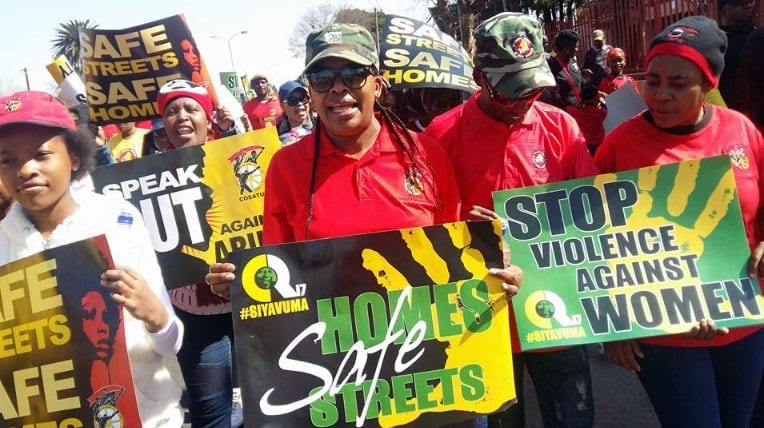
Discrimination, marginalization and powerful political forces like authoritarianism do not stop at a country’s border—and that is why it is so important for black women worldwide connect through their unions and allied organizations, panelists said Thursday at a Solidarity Center-sponsored event.
“We need to strengthen this kind of international unity as a way to strengthen our fight in Brazil. Racism does not manifest only in one society,” said Rosana Fernandes, a leader at the national Central Union of Workers (CUT) in Brazil.
Fernandes spoke at the panel, Black Women’s Power: Advancing Partnership Between Unions and Global Racial Justice Movements, a conversation with union leaders and members of the Black Women’s Roundtable on advancing racial and gender justice through labor movements worldwide. Members of the Black Women’s Roundtable, part of the National Coalition on Black Civic Participation, were joined by the Coalition of Black Trade Unionists (CBTU) and the Global African Workers (GAW), along with Sarah McKenzie, Solidarity Center program coordination director.
“The Black Women’s Roundtable seeks the liberation of Black people so they can strengthen the healthy wealthy and wise opportunities for Black women here and around the world,” said Carol Joyner, director of the Labor Project and policy lead at the Black Women’s Roundtable. Members of the Black Women’s Roundtable have engaged in exchange programs with Black women workers in Brazil, Cameroon, Colombia, Ghana, Guinea and Kenya. Elsie Scott, founding director of the Ronald Walters Leadership and Public Policy Center at Howard University and Black Women’s Roundtable member, also took part. Scott is the former president of the Congressional Black Caucus Foundation.
Panelists engaged in conversation with Solidarity Center staff from around the world, including from Albania, Bangladesh, Brazil, Cambodia, Colombia, El Salvador, Honduras, Kenya, Jordan, Lesotho, Mexico, Morocco, Niigeria, Palestine, Serbia and South Africa. Solidarity Center’s Viviana Osorio Pérez, equality and inclusion director and Hanad Mohamud, program coordination and leadership associate director, moderated the panel.
‘We Have to Unite in Our Struggles’
From CBTU’s founding in 1972, members recognized they needed to connect with Black workers globally, Apollos Baker told the audience. CBTU began by coalition-building alongside unions in South Africa, where workers struggled under brutal apartheid laws.
Baker, special assistant to the New York State AFL-CIO secretary treasurer and CBTU activist, said that now, as union officials around the globe are threatened and attacked for “pressing their countries to be pro-worker, pro-Black,” CBTU and GAW work to ensure they and their families have the support they need. “We have to make sure asylum is available to people,” he said.
Agripina Hurtado, former president of the Afro Colombian Labor Council in Colombia and a GAW member, described her conversations with Black women in Colombia about how racial discrimination impacts them in workplaces, and pointed out that it is important for workers to be aware of international laws and “all the instruments of international justice.”
“We have to unite our struggles, our fights, especially women, who suffer discrimination because of their gender, their color,” she said. “We have to be agents of change to transform our society.”
Uniting Globally to End Racism
Hurtado lifted up the game-changing national election of a progressive slate of candidates in 2022 that includes Francia Márquez, a former housekeeper, union member and Colombia’s first Black vice president.
We now “have a vice president who comes from the neighborhoods, who’s Black, worker, the first African descendant woman” a milestone that shows that “women in particular can get to what we work toward.”
Fernandes also described the difficult conditions Black and Indigenous women face, including lack of access to water in marginalized communities and job discrimination even when they have university educations.
CUT has long tackled racism and discrimination, and recently produced videos in which Black men and women describe how racism impacts their lives. The videos also show alternatives, offering ways to fight racism in society. But “the anti-racist struggle must be international,” Fernandes said.
“This kind of international forum is helping us and strengthening our capacity to fight for workers.”

